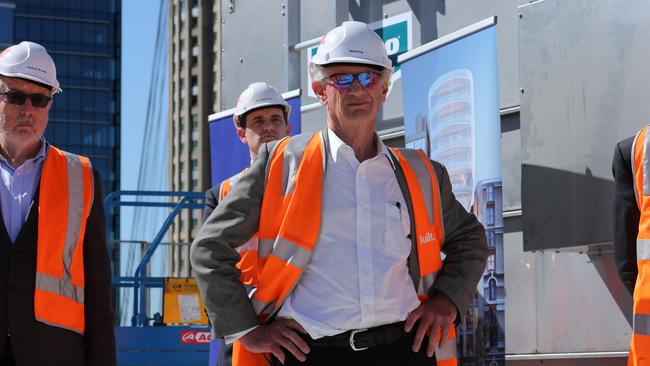Wal King back in the game he loves
Building legend Wal King is back in the game as independent chairman of private company Built

Building legend Wal King is back in the game that he obviously loves with the former Leighton Holdings boss stepping back into the public arena as independent chairman of private company Built.
He has been quietly involved for almost three years, alongside former right hand man and fellow Leighton stalwart Dieter Adamsas, but as Built has taken off he is looking to take the company to the next level.
In the decade since King ran Leighton the construction world has dramatically changed. Many of the big names that dominated back when King and Adamsas teamed to take Leighton from its humble beginnings to a $25bn titan are gone.
The John Roberts-founded Multiplex was taken over by Canada’s Brookfield, the Lendlease machine stumbled in engineering, and Grocon has been struck down and wants out of building.
By early 2014, the long-running drama over Leighton’s future came to a close as it was bought by Spain’s Grupo ACS and renamed CIMIC.
By that stage King was long gone from the company, as David Stewart was chosen to succeed him as CEO in August 2010, bringing his 23-year reign to an end.
The era of Australia’s great entrepreneurial builders appeared to be snuffed out.
“Unfortunately, time moves on,” Mr King tells The Australian at the topping out of Built’s latest Sydney CBD building. But the firm, founded by Marco Rossi, is taking major strides towards becoming an integrated top tier builder and developer, with more than a hint it has Leighton-like ambitions.
“There’s a bit of a fault line in the market where the big companies are preoccupied,” King says. “It’s opened up an opportunity for a smaller, faster moving local company.”
While not directly criticising the global giants that now dominate, King points to the advantages of a focused, local operation. “They are far more able to sustain the culture, which I think fantastic, and culture does matter,” he said.
Built has what he looks for in a company. “It’s the can-do attitude of the management; they are here, they focused on it, they are close to the workforce, all the ingredients are there to go on to be a bigger and successful company,” King said.
King and Adamsas, with whom he has remained close since they exited Leightons, are not yet talking partners and the public market.
But they are putting structures in place for Built’s expansion as it takes on more projects, with both seeing Rossi, who started out in western Sydney, as having the leadership qualities to foster a great company.
King appears to have found an entrepreneurial zest that could grow to match the Leighton culture during its heyday, and Built’s ceremony on Wednesday to top out of its new Sydney office development, Sub Station No. 164 on Clarence Street, also marked his first public outing as Built’s new chairman and Adamsas as independent director.
While Rossi joked that he’d been a demanding client of his building team, it also reflected the high standards of the Leightons pair.
While offices and hotel projects may quieten down King is casting a wider vista for Built.
He called out opportunities in sectors including education, health and defence, areas he sees as levers the government can use to drive the stalled economy more quickly out of recession.
Built started as a fit-out contractor and diversified into commercial building and became a developer.
“We would see them now diversifying further into PPPs, design, build and project management work, to give them this greater diversity,” King says.
“There’s a big market out there, and we just need to be careful that we keep the capability of the company in equilibrium. Built will go on to be a tier one contractor in Australia … all these things are pointed in the right direction.”
King calls the coronavirus crisis a “fault line” in history akin to the Spanish flu, with the world to take on a different form. “There’s winners and losers … so it’s a question of being able to respond to the new market,” he said.
He predicts a “changed” market with government stimulus rolling through to infrastructure projects.
“So it’s a question of how we effectively respond. And undoubtedly, there is a fault line with COVID, it’ll be different on the other side of that,” King says.
Governments are sending signals they are open for business and are desperate to get the building sector going. The veteran is cautious about how this will work in practice, saying “they’re sending the signals. but a lot of this stuff is very difficult to turn into reality”.
King cites extended approval and environmental processes for major projects at multiple levels of government.
“What you can’t fast-track is the regulatory approval step,” he says. “The big challenge for the government is turning their desires into reality.”




To join the conversation, please log in. Don't have an account? Register
Join the conversation, you are commenting as Logout